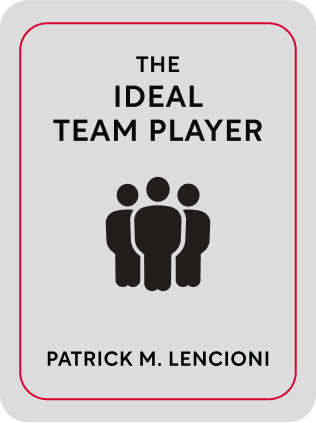

This article is an excerpt from the Shortform book guide to "The Ideal Team Player" by Patrick M. Lencioni. Shortform has the world's best summaries and analyses of books you should be reading.
Like this article? Sign up for a free trial here .
Are you looking for The Ideal Team Player quotes by Patrick Lencioni? What are some of the most noteworthy passages worth revisiting?
In The Ideal Team Player, author and business consultant Patrick Lencioni describes the model team player and explains how to develop current employees into team players and make sure you hire team players in the future. The central idea is how the three essential qualities of a team player (hungry, humble, and smart) combined can transform any organization.
The following The Ideal Team Player quotes highlight some of the key points.
Quotes From The Ideal Team Player
The Ideal Team Player defines three essential personal qualities or “virtues” an ideal team player embodies—humility, hunger or drive, and people skills. The following The Ideal Team Player quotes highlight the three qualities of Patrick Lencioni’s ideal team player.
“Leaders who can identify, hire, and cultivate employees who are humble, hungry, and smart will have a serious advantage over those who cannot.”
For leaders committed to a teamwork culture, the right people are ideal team players who are humble, hungry, and smart. People who are humble focus on the success of the team rather than their personal interests. People who are hungry are driven to seek more work and responsibility. And people who are smart have common sense when it comes to dealing with people—they understand where others are coming from.
“Great team players lack excessive ego or concerns about status. They are quick to point out the contributions of others and slow to seek attention for their own. They share credit, emphasize team over self, and define success collectively rather than individually. It is no great surprise, then, that humility is the single greatest and most indispensable attribute of being a team player.”
Here, Lencioni discusses the first quality of an ideal team player—humility. Humble team players focus on the success of the team rather than personal interests. They lack overbearing egos or an obsession with status. They don’t try to get attention and readily give credit to others.
Humility is the most important team player attribute, yet many managers put up with self-centered people because of their skills, and don’t call out their arrogance even though it undermines the team’s performance. There are two kinds of non-humble people, who seem different but who have a common underlying issue: insecurity.
1) Arrogant, ego-driven people who try to make themselves the center of attention. They are less confident than they appear, so they try to overcompensate with bluster. They undermine teamwork by stirring resentment, creating division, and playing politics.
2) People who lack self-confidence and downplay their contributions and abilities. Others may see them as humble because they’re self-effacing, but people who are truly humble neither overrate nor underrate themselves. People with low self-worth deprive teams of their ideas and insights.
“Hungry Only: The Bulldozer”
Hunger is the second quality of Patrick Lencioni’s ideal team player. People who are hungry are driven to seek more work and responsibility. They’re always looking ahead to the next step or opportunity. They’re committed to the work and willing to go above and beyond—for instance, working outside regular hours—when necessary. Managers don’t have to push or monitor them because they’re self-motivated and conscientious.
Nonetheless, if an employee has hunger but is lacking in the other two virtues, they are what Lencioni calls “the bulldozer”. They are driven by self-interest rather than a desire to support the team’s mission. Their interests may conflict with the team’s. Or, work can become all-consuming and become a person’s identity and life.
“So many people there are so concerned about being socially conscious and environmentally aware, but they don’t give a second thought to how they treat the guy washing their car or cutting their grass.”
Here, Lencioni is referring to the third quality of an ideal team player—being smart. Being smart in a team context doesn’t refer to intelligence but to having common sense when it comes to dealing with people. Those with people skills understand where others are coming from. They ask questions and listen attentively. They are aware of group dynamics and of the impact of their words and actions on others, and they act appropriately.

———End of Preview———
Like what you just read? Read the rest of the world's best book summary and analysis of Patrick M. Lencioni's "The Ideal Team Player" at Shortform .
Here's what you'll find in our full The Ideal Team Player summary :
- The qualities of a model team player
- How to transform your organization by developing your current employees into team players
- How to make sure you hire team players in the future






